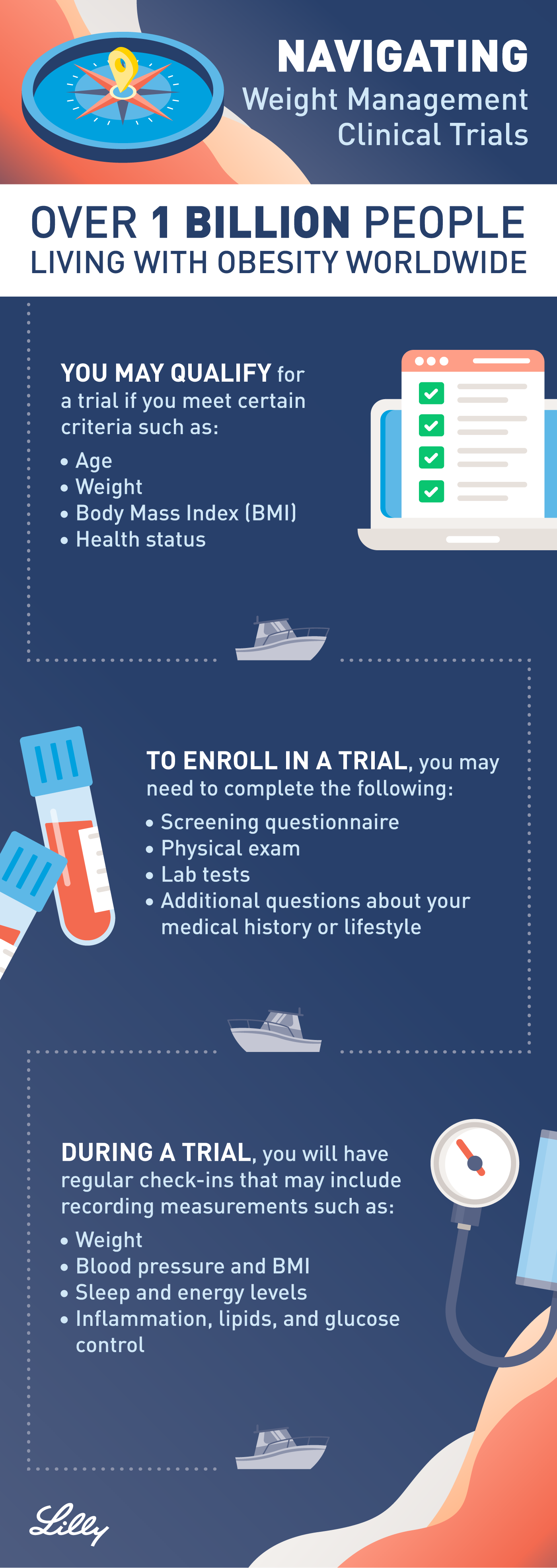The World Health Organization (WHO) reports that more than 1 billion people worldwide are living with obesity today. Obesity is a complex, chronic (long-term) condition. It needs evidence-based treatment and maintenance, and there are many care options available.
Clinical Trials as a Care Option
As you look for ways to manage your care, it is important to note that the world of weight management is evolving. New treatments are being developed and innovative research is happening in this area. For those who struggle with weight management and related health issues, joining a clinical trial can be a valuable opportunity. It can also lead to the discovery of new therapies and help towards improving your own wellbeing. In this post, we will explore what to expect in a clinical trial for weight management. The aim is to help potential participants and their loved ones understand more about the process and feel prepared for this unique journey.
In the following infographic you can learn about key steps and assessments in a weight management clinical trial. Below the infographic you can discover more about these points, read about the participant experience and connect with us on social media.

Getting Started: Understanding Eligibility and Enrollment
The first step is to see if you qualify for the weight management clinical trial. Each trial will have a set of eligibility criteria, these describe the people who are able to take part in the trial. Eligibility criteria will vary based on the specific trial, but may include factors such as:
- Age
- Weight
- Body Mass Index (BMI)
- Overall health status
Some trials may also require participants to have certain conditions, such as diabetes or high blood pressure.
To enroll in a trial, you will complete a screening questionnaire and usually have an evaluation which can include:
- A physical exam
- Lab tests
- More questions about your medical history and lifestyle
Weight management clinical trials often involve interventions (treatments). These may include medications or changes to your lifestyle, and sometimes they involve a mixture of both. The protocols (clinical trial plans) are carefully designed to assess how safe and effective the intervention is.
Monitoring and Measurements
During a clinical trial, you will have regular check-ins with the study team to learn about your overall health and wellbeing.
Measurements in a weight management trial can include (but are not limited to):
- Weight
- Monitoring changes in weight
- Blood Pressure and BMI
- These factors are often closely linked to weight management and metabolic health (how your body manages energy). They can help researchers better understand the effects of the intervention on your body.
- Sleep and Energy Levels
- Sleep is linked to changes in the levels of hormones that impact weight and appetite.
- Weight management often involves looking at how lifestyle factors like sleep and energy can impact weight and wellness. Monitoring these factors can show us the holistic impact of the interventions.
- Inflammation, Lipids, and Blood Glucose Control
- These factors can provide important insights into the trial’s impact on cardiovascular health (heart and circulation system), which is often linked to weight management.
Your Experience as a Participant
Weight management is a complex issue and strong support networks can be key to helping you achieve and maintain success. Taking part in a clinical trial for weight management can be an empowering experience. It can provide access to cutting-edge treatments and a supportive environment for change.
As a participant, you will play a key role in advancing our understanding of weight management. You will also contribute to the development of therapies that could improve so many lives. By staying informed and proactive about your participation, you can feel confident in taking this opportunity. It may make a lasting difference to your life as well as the lives of others.
If you are interested in learning more about weight management clinical research studies, visit our Weight Management Site.
Stay connected with us on Twitter @Lilly Trials and Facebook @Lilly Trials for more insight into clinical trials, groundbreaking research, inspiring participant stories, and more!

